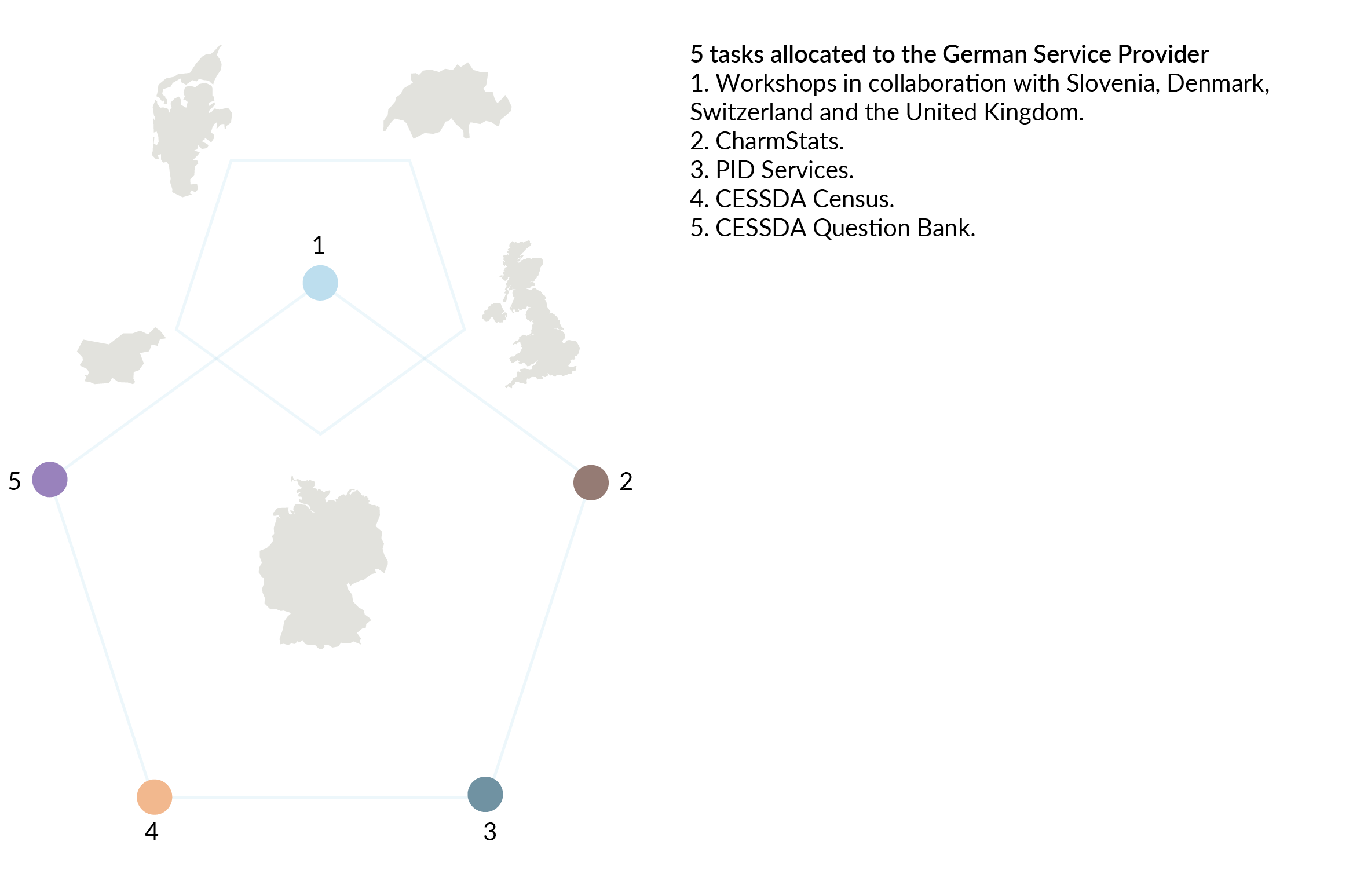Annex 6 of the current CESSDA Statutes allocates specific tasks to the German Service Provider. One of the tasks, training, has been judged to be a permanent CESSDA activity with its own branding, CESSDA Training. It has been allocated a yearly budget cycle and a dedicated section on the CESSDA website. The rest of the tasks, namely PID services, Harmonisation, and Question Databank offer an annual activity and budgetary report. In 2015, the German Service Provider, GESIS – Leibniz Institute for the Social Sciences, conducted a series of activities based on the 2015 Work Plan. Activities in 2015 included:
Public Relations
In order to enable efficient work, CESSDA Training together with the Main Office (MO) created content for the CESSDA Training section of the new CESSDA website, launched in June 2015. The website now contains information and resources on digital preservation and research data management for the research and archiving community. These materials will be regularly updated to include more topics and new trends in the practice of data curation. CESSDA Training also conceptualised and prepared the implementation of a knowledge-sharing platform that will collect all relevant work of CESSDA Service Providers on Digital Preservation and Research Data Management. The implementation will be carried out through the CESSDA SaW project.
CESSDA Training contributed to the promotion of CESSDA by attending various conferences and meetings e.g. IASSIST 2015 in Minneapolis, USA, the DINI/nestor Workshop 2015 in Berlin, Germany, and the DPASSH conference 2015 in Dublin, Ireland and by redesigning the CESSDA Training Blog which features activities and relevant events in the context of research data management and digital preservation.
CESSDA Census
In order to better understand the CESSDA community and its needs, the CESSDA Census was initiated and questionnaires were developed, designed and internally pre-tested for the heads of the CESSDA member archives as well as for the members of staff involved in CESSDA activities. The first Census is planned to be carried out in 2016.
Workshops
CESSDA Training held two face-to-face trainings and one workshop at GESIS Cologne for staff members of institutions non-affiliated to CESSDA and to CESSDA's user community. As a part of the FOSTER-CESSDA project, CESSDA Training successfully cooperated with other workshop providers within CESSDA, and improved its own workshop materials. All training materials will be uploaded to the knowledge-sharing platform, once it is established.
Coding and Harmonisation of Statistics (CharmStats) in CESSDA.
“Data harmonisation” refers to the process of transforming data from different sources into standard measures that facilitate undertaking research involving the comparison of sources. The future CESSDA ERIC should foster the use of free and open source software that directly stores and connects all the components of data harmonisation work, in particular ex-post data harmonisation. CharmStats – an abbreviation for ‘Coding and Harmonisation of Statistics’ – products are a digital solution to the problems of combining multiple types of metadata and information that are needed for harmonisation documentation. The improved and updated version of QuickCharmStats 1.1 (QCS) was presented in 2015. QSC is designed for those researchers who harmonise variables for use in publishable statistical analyses (QuickCharmStats 1.0 released in 2014). The software and supporting documentation can be accessed for free online.
A database server version of the software designed for large-scale survey variable documentation called CharmStats Pro was developed during the course of 2015. After internal feedback and bug testing, the new software is due to be released mid-2016. It will also be open source and free to the public.
Euro Question Bank in CESSDA
The CESSDA Question Bank is a part of a larger envisioned system which will allow sharing and reuse of many of the resources held by the CESSDA archives. The initial requirements collection for the Question Bank started in 2015, based on GESIS’ Applications. Some coordination with CESSDA Work Plan tasks 2015 was undertaken to ensure a close collaboration on common tools and infrastructure for development and interoperability with other planned CESSDA developments.
CESSDA PID Services
The persistent identification (PID) of the data holdings of CESSDA Service Providers is a demanding issue. The functionality to unambiguously locate and access digital resources and associate them with the related metadata is becoming essential to allow the citation, retrieval and preservation of these data. CESSDA Service Providers need to introduce the use of PID for their data since maintaining and resolving PID is seen as a must for repository systems with a long term strategy.
Overview:
Next section: Work plan task

